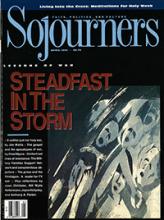The following call was issued on Ash Wednesday, February 13, by leaders of more than 20 Protestant and Orthodox denominations, including five historic black churches; as well as 15 Roman Catholic bishops; dozens of Catholic women's and men's orders; evangelical groups; and a variety of ecumenical organizations and movements. A complete list of signers is available from Sojourners.
The churches are at the forefront of those urging peaceful alternatives to war in the Middle East. We said, "War is not the answer." We have wrestled with our varied theological traditions, returning to fundamental questions of the Christian faith. We agreed that the stakes in human lives were so high, and the potential for catastrophe in a Middle East war so great, that military confrontation had to be averted. Even in victory there would be no winners in this war. War would bring nothing but loss to us all and unleash violence that would only multiply and reverberate around the region and the world in the days ahead -- and likely even for generations to come. We insisted that there are alternatives to war and indicated what they could be.
But now the nation is at war -- a war that should have been avoided. And a great human tragedy of yet unknown proportions has begun to unfold. When Gabriel Habib, General Secretary of the Middle East Council of Churches, was recently asked by a BBC reporter, "Whose side is God on in this war?" his response was: "God is on the side of the suffering."
Read the Full Article

